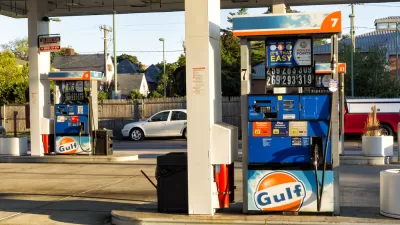Increasing vehicle standards means decreasing gasoline usage--and tax revenues. A new report suggests that a wholesale rethinking of how we pay for transportation infrastructure may be in order.
The study, released by University of Virginia's Miller Center of Public Affairs, points to a growing problem in transportation funding. Gasoline taxes have historically served as a user's fee, with taxes paid roughly proportional to miles driven, but with today's more fuel efficient vehicles, a mismatch between taxes paid and services consumed can occur.
The report suggests a better solution might be taxing vehicle miles traveled. Emily Badger writes:
'What's needed now is not a higher gas tax, but a whole new way of looking at how we pay our fair share for using public roads We shouldn't fill road coffers according to how much gas we buy, but how many miles we drive.'
FULL STORY: Transportation Theorists Rally Around Vehicle-Miles-Traveled Tax

Maui's Vacation Rental Debate Turns Ugly
Verbal attacks, misinformation campaigns and fistfights plague a high-stakes debate to convert thousands of vacation rentals into long-term housing.

Planetizen Federal Action Tracker
A weekly monitor of how Trump’s orders and actions are impacting planners and planning in America.

Chicago’s Ghost Rails
Just beneath the surface of the modern city lie the remnants of its expansive early 20th-century streetcar system.

Bend, Oregon Zoning Reforms Prioritize Small-Scale Housing
The city altered its zoning code to allow multi-family housing and eliminated parking mandates citywide.

Amtrak Cutting Jobs, Funding to High-Speed Rail
The agency plans to cut 10 percent of its workforce and has confirmed it will not fund new high-speed rail projects.

LA Denies Basic Services to Unhoused Residents
The city has repeatedly failed to respond to requests for trash pickup at encampment sites, and eliminated a program that provided mobile showers and toilets.
Urban Design for Planners 1: Software Tools
This six-course series explores essential urban design concepts using open source software and equips planners with the tools they need to participate fully in the urban design process.
Planning for Universal Design
Learn the tools for implementing Universal Design in planning regulations.
planning NEXT
Appalachian Highlands Housing Partners
Mpact (founded as Rail~Volution)
City of Camden Redevelopment Agency
City of Astoria
City of Portland
City of Laramie




























